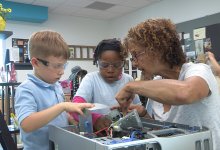Communication Skills
Prepare students for academic and life success by helping them develop their listening, speaking, writing, and digital media skills.
Building Students’ Confidence Through Community-Based Instruction
A special education teacher explains how she provides opportunities for students to practice life skills outside the classroom.132Your content has been saved!
Go to My Saved Content.Adapting Socratic Seminars for Elementary
With a few key modifications, teachers can make a complex academic discussion into an excellent learning opportunity for younger students.How Learning Happens
In this video series, we explore how educators can guide all students, regardless of their developmental starting points, to become productive and engaged learners.31.2kYour content has been saved!
Go to My Saved Content.3 Great Discussion Models for High School English
These models move beyond Socratic seminars to provide students with authentic, engaging class discussions.500Your content has been saved!
Go to My Saved Content.Why Students Don’t Ask for Help—and How to Change That
These three simple shifts can help students realize that asking for help is an expectation in your class and boost their self-efficacy.Fostering Philosophical Thinking in Preschool
Young children naturally explore deep questions—how should we act toward each other? how do we know things?—and teachers can encourage their curiosity and growing understanding.175Your content has been saved!
Go to My Saved Content.Using Discussions to Inspire Active Participation in Learning
By tracking academic conversations with a visual map and sharing it in class, teachers can encourage more students to contribute.5 Ways to Elevate Your Classroom Discussions
Even when many students hesitate to speak up, teachers can inspire thoughtful, vibrant discussion with these classroom-tested strategies.How Short Writing Activities Help Build a Strong Math Community
The opportunity to reflect on what they know helps students strengthen their mathematical understanding and supports communication skills.210Your content has been saved!
Go to My Saved Content.Using Hand Signals for More Equitable Discussions
Whether your class discussions are online or off, hand signals enable students to engage in multiple ways.31.8kYour content has been saved!
Go to My Saved Content.A Simple Way to Get Elementary Students Writing Every Day
With this easy-to-adapt quick-write strategy, students steadily build their writing skills, a little at a time.Elevating Public Speaking Skills With Tools From Theater Arts
A workshop with an actor goes a long way in teaching students how to articulate and present their knowledge—and builds their confidence.Your content has been saved!
Go to My Saved Content.What School Leaders Would Say to Themselves If They Could Go Back in Time
Ten experienced principals from all over the United States impart advice for new administrators—the kinds of things they wish they had known.188Your content has been saved!
Go to My Saved Content.What to Say Instead of ‘I’m Proud of You’
A few phrases middle and high school teachers can use to cultivate conversation while celebrating student achievements.16.9kYour content has been saved!
Go to My Saved Content.Using Songs to Boost Literacy in Kindergarten
Research-based strategies for supporting the development of reading and speaking skills, no instruments required.258Your content has been saved!
Go to My Saved Content.













